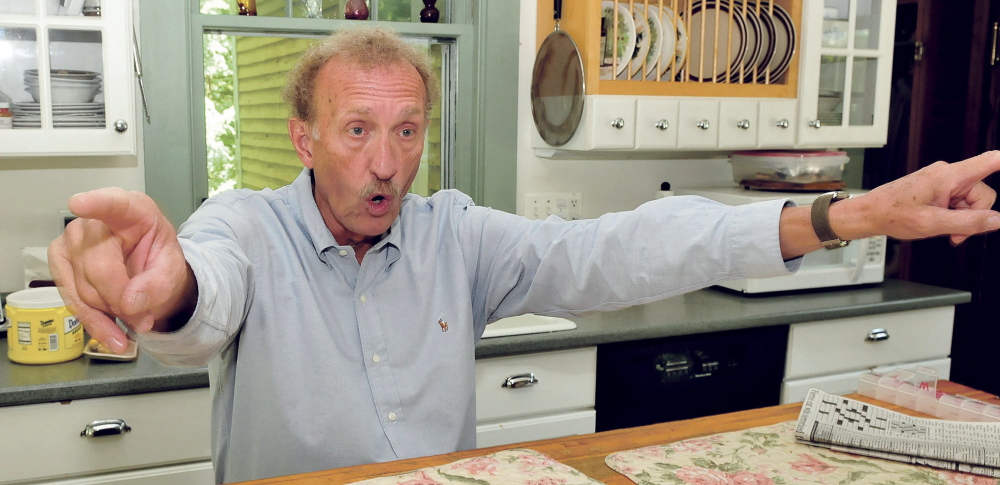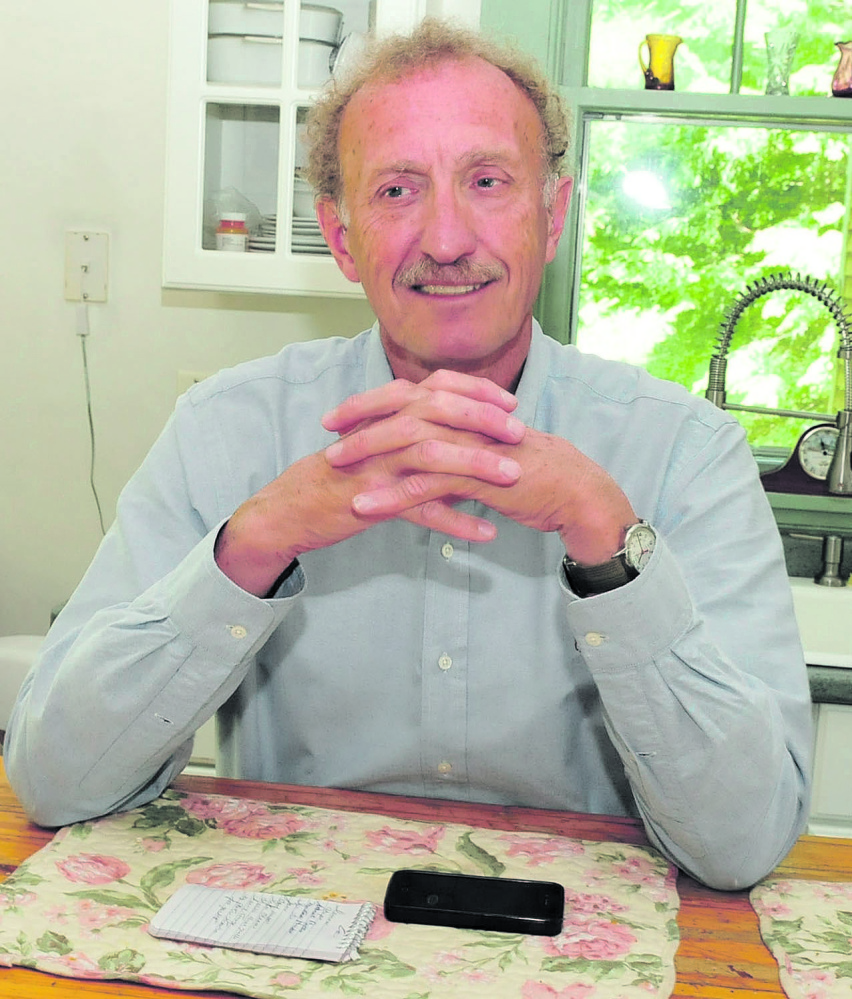The effects of a brain injury from a November 2011 automobile accident got so bad for Newport lawyer Dale Thistle that he finally reported himself to the state Board of Overseers of the Bar.
That report and other complaints about his work led to Thistle’s indefinite suspension from practice by the Maine Supreme Judicial Court this month. Complaints to the bar included Thistle’s alleged mishandling of a divorce case, real estate litigation that took too long and on a couple of occasions, misspeaking to the judge in the courtroom.
The June 6 order of suspension, based on a recommendation by the Board of Overseers, refers to Thistle, 66, of Skowhegan, as a “disabled attorney” whose injury caused him to violate the rules of professional conduct and as someone who is “a threat to clients, the public and to the administration of justice.”
Thistle said he agrees with the suspension. He said persistent seizures, mini-blackouts and a lack of direction paint the real picture of what he can do and what he can no longer do following damages to the nerves in his right frontal lobe.
“They are right — I did not disagree with the action of the board of overseers,” he said in an interview. “The complaints are serious and meritorious and directly stem from my brain injury. I even self-reported a misfiling in federal court. I made an error in filing a document — an error I would never have made previously. I reported on myself, in other words.”
Attorney Gordon Johnson, founder of the Brain Injury Law Group in Sheboygan, Wis., said that while damage to the frontal lobe can be life-changing, there can be hope — not for regeneration of the broken nerves, but from a redirection of the brain’s activity. The frontal lobe of the brain, its largest part, deals with what Johnson calls “executive actions.”
“The executive of the brain is like the CEO of the brain — that’s the person who plans, who marshals assets to get something done. It’s the person who makes the decisions — it’s like what the conductor of the symphony will do,” Johnson said. “I’m a believer in a lifetime of recovery from traumatic brain injury. I believe that the brain has the capacity to use parts of the brain that are not injured to do functions that previously were done by the injured areas.”
LASTING EFFECTS
Thistle said the accident that led to his brain injury happened about 10:30 a.m. Nov. 17, 2011, on Main Street in Palmyra, U.S. Route 2. He said a woman drove through a stop sign on Raymond Road and hit him as he drove west toward Skowhegan.
“She hit me on the driver’s door as I tried to get out of the way and she hit me again on the driver’s rear wheel and sent me flying counterclockwise,” Thistle recalled. “I flew across a ditch and landed on the road she came out of. It threw my head sideways and back, to the right and to the left.”
He was treated and released from Sebasticook Valley Hospital in Pittsfield. Both vehicles were destroyed, and police did not file any charges against the woman. A state police crash report confirms details of the accident and notes that Thistle and the other driver were injured.
After the accident, Thistle and his mother traveled to England to spend Thanksgiving with his oldest daughter. That’s when symptoms of brain injury began showing up.
He said family members noticed he was sleeping for long stretches of time.
“Three nights after we got there, at dinner, at the table with my family present, I started talking nonsense,” he said. “I started referring to my daughter as my first wife. They took me to the emergency room in Bath, England, where I was diagnosed with a severe concussion.”
Back in Maine that December, doctors said Thistle suffered from traumatic brain injury, for which he continues to be treated. The nerves in his right frontal lobe had been severed and cannot be regenerated, he said.
The problems he experienced brought him to the point where, he said, he can’t function effectively as a trial lawyer. Thistle said that since the accident he has experienced problems with decision making, organization and discipline.
The frontal lobes are involved in motor function, problem solving, spontaneity, memory, language, judgment and impulse control. Some types of brain injury take longer to overcome, but any kind of recovery will be harder for someone over 50 than for someone who is 25, according to Johnson.
The capacity to substitute functions of the brain and find flexible solutions also diminishes with age, Johnson said in a telephone interview.
He said the bottom line is to keep mentally active.
“I would not prescribe him to stop using his brain,” Johnson said. “I would do the opposite — I would prescribe him to use his brain, but perhaps in less stressful ways.”
Johnson said that someone like Thistle should consider a career where the mistakes are less critical to others.
“Any brain injury symptoms can be accommodated for,” he said. “I would not say that anyone is permanently disabled from a traumatic brain injury until they have exhausted opportunities to relearn and to accommodate those injuries.”
LAW CAREER
Thistle began to make a name for himself in Maine criminal justice circles in 1994 when he represented Sheri Lee Johnson of Old Orchard Beach. Johnson was 14 years old in October 1993 when she stabbed her great aunt, Hazel Davison, 106 times with a kitchen knife in Davison’s Skowhegan home. Thistle convinced the judge to try Johnson as a juvenile, rather than as an adult.
“Sheri Johnson spent six years in the Youth Center rather than 65 years in an adult female prison,” he said.
She was released from the Youth Center in South Portland in December 1999 when she turned 21.
Thistle also represented Jeffrey Cookson after he was charnged with double homicide in 2000 for the shooting death of his former girlfriend, Mindy Gould, 20, and 2-year-old Treven Cunningham, whom she was baby-sitting, in December 1999 in Dexter. Cookson ultimately was found guilty.
Thistle also represented clients in civil cases in federal court, including a class action lawsuit brought by dozens of people who said they were illegally strip searched in the Knox County jail, ending in a $3 million settlement.
Thistle’s former law partner Joshua Tardy, of Newport, who represented him during recent hearings before the bar, said Thistle is a proud father who is quick to relate success stories about his children and is equally at ease hunting and fishing as he is in the courtroom.
“The thing that strikes me about Dale Thistle the lawyer is that he cares deeply for his clients,” said Tardy, a former Maine House minority leader. “He’s passionate for their causes
“As a lawyer, I felt Dale had an exceptional ability to connect with juries,” he said. “Dale also felt that it was in the best interest of his clients to step aside so he could focus on his health.”
Tardy said Thistle is in tune with local high school athletics and is aware of what is going on in his community. He said he has hope that Thistle will fully recover. In the meantime, he said, Thistle will devote himself to his treatment and steer clear of the high stress of being a lawyer.
“The injuries that Dale sustained in this automobile accident are serious and the prognosis is never truly clear, but I do believe that Dale is making some improvements already,” Tardy said. “I think so long as he can focus on his recovery, he’s going to have a better outcome — I’m hoping for 100 percent improvement and time will tell.”
REINSTATEMENT POSSIBLE
Thistle said if he can demonstrate medical improvement, he can apply for reinstatement of his right to practice law. In the meantime, his practice has been turned over to attorney Michael Wiers of Newport.
Wiers wouldn’t comment on Thistle’s situation.
Thistle’s road to full recovery is not easy.
“I have to say, discouragingly, I’m beginning to think there’s no possibility of improvement, because I’ve waited two and a half years for some improvement and I have none,” Thistle said. “I’ve had my IQ tested and I’m just as smart as I’ve always been — I haven’t lost my intelligence — I’ve only lost the ability to perform executive functions within my head as a result of the damage.
“I have no plans at the moment. I don’t know what I’m going to do.”
Thistle said that though he has not practiced law in more than month, he keeps mentally active reading books, fly fishing, hiking, rustic camping, tending to a vegetable garden and visiting with his grown children, grandchildren and his girlfriend. He lives with his mother in his 1840s Greek Revival home built for Philander Coburn, brother of Gov. Abner Coburn of Skowhegan.
Thistle said he continues to have minor seizures that he said he is unaware of, but others tell him about. Sometimes he loses touch with where he is. He said he has been advised by friends and family members to give up driving until his condition improves.
“It appears to me that I have little direction at the present time,” he said. “I had, in my office, when I received the suspension, a number of very good cases, two of which were in federal court and I gave them up — I withdrew from them because I simply couldn’t do that kind of work anymore. I couldn’t organize my day to day life — I couldn’t stick to the tasks. It’s just the result of the brain injury.”
Doug Harlow — 612-2367
Twitter: @Doug_Harlow
Send questions/comments to the editors.





Comments are no longer available on this story